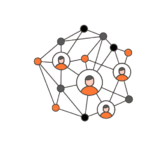
Navigating Challenges: Being a good Technical Lead. Part 1.
Kristijan Pušić | March 4th, 2024
Skillset of the Technical Lead goes from his recruitment and hiring skills, leadership, client communication, to mentorship and project onboarding skills. Five skills with 5 levels each.
Among all the backend dev seniors, including fullstack ones, there are those few that are a bit more special. They are the 1st person each new developer meets in your company. Company culture is spread through words of the Technical Lead. Each client sees your company through things said and done by your Technical Lead.
The Technical Lead effect on inner company culture and client relations is biggest out of all your employees. From recruiting, hiring, skill raises, clients relations and predicting time spent and budgeting your current and future client requirements. But how to breed a good TL? How to help him advance in his specific role expectations? Some of the role specifics can be different depending whether you are an outsourcing IT company or a product company. Product companies don’t have outside clients and outside client relationships as a main business driver. This article will keep the outsourcing company’s views on the mentorship skill of a Technical Lead. The other 4 skills I will explain in the next blog post.
Mentoring your TL is a must have during his career. Helping and pointing him to understand and resolve issues he finds in his complex work is a prerogative of any company HR department.
Mentorship levels represent a tech lead’s mentoring journey from the junior level to a sophisticated approach involving career development and team evolution in his more senior years. Let’s dive deeper into each level.
Mentorship level 1: The Initial Demonstrator (junior)
In the initial phase, at the beginning of the developer TL journey his mentorship approach is straightforward, more simple. They show how tasks are done by example, without considering the trainee’s existing skill level or his ability to learn himself. This stage is characterized by a hands-on approach, with the tech lead demonstrating tasks and expecting the trainee to observe and learn. The primary limitation at this stage is the lack of personalized development goals for the trainee, making the mentorship somewhat generic and possibly less effective for individuals with different learning needs.
Mentorship level 2: The Knowledge Adjuster (middle)
As the tech lead advances to the next stage, they become more aware of the trainee’s level and start to tailor their mentorship approach accordingly. They can identify knowledge gaps and discuss ways to bridge these gaps, making the onboarding process more effective. However, at this stage, the tech lead does not actively track the trainee’s progress, leaving the responsibility for learning with the trainee. This stage marks the beginning of a more adaptive and responsive mentorship style, although it still lacks active engagement in the trainee’s development journey.
Mentorship level 3: The Developer of Potential (middle high)
Reaching the midpoint of the mentorship evolution, the tech lead now evaluates not only knowledge gaps but also the potential of the trainee. They can suggest roles and competencies that fit the trainee’s profile, draft a development plan, and take responsibility for the trainee’s adherence to this plan. This stage is significant for its focus on personalized development, marking a shift from merely imparting knowledge to actively shaping the trainee’s career trajectory.
Mentorship level 4: The Team Architect (senior)
At this advanced stage, the tech lead possesses a qualitative and quantitative understanding of their colleagues’ competencies. They know how to align individual development plans with the team’s needs, facilitating the growth of both individuals and the team as a whole. This stage is characterized by a holistic approach to mentorship, where the tech lead not only teaches but also orchestrates the exchange of experiences within the team, enhancing the collective knowledge and skills.
Mentorship level 5: The Visionary Mentor (senior +)
In the final stage, the tech lead transcends traditional mentorship roles to become a visionary mentor. They build career tracks for each team member and the team collectively, treating the team as a dynamic entity capable of growth and evolution. This stage involves identifying both individual and team development opportunities, organizing cross-specialization experience exchanges, and actively participating in external knowledge-sharing activities. The visionary mentor has a profound impact on the team’s long-term success and resilience, fostering an environment where continuous learning and adaptation are integral to the team’s culture.
Today’s senior developers are much younger than they were before, after 4,5 years in the industry, it is considered a developer can be senior. Consequently, Technical Leadership is becoming a playground for the people who are too young. How much are your clients ready for this? How much of leadership and mentorship processes can run smoothly if people with less experience are doing it?
Answer is quite simple. Even your younger TLs must learn from something or somebody how to do some things correctly and what to keep in mind in certain situations. This article is a step in that direction. Let them know what is expected out of them on their mentorship journey. Younger people tend to change more easily and more fastly. Believe in your younger TL generations but give them enough knowledge to be able to perform on levels that are expected. Mentorship skill is explained in 5 levels, read more about other TL skills in the next blog post.
FAQ
1. How Does a Technical Lead Balance Technical Responsibilities with Mentorship Duties?
Balancing technical responsibilities with mentorship duties is a common challenge for Technical Leads. Effective TLs use time management and delegation of the tasks to ensure that all team members receive adequate attention. This involves setting automatic acceptance, code review is being done by the whole team, scheduling regular mentorship sessions, and utilizing team strengths to manage technical tasks efficiently. Additionally, TLs should cultivate a culture of mutual support within the team, encouraging team members to assist each other, which in turn reduces the mentorship load on the TL and fosters a collaborative team environment.
2. How Can Technical Leads Measure the Success of Their Mentorship?
Measuring the success of mentorship is being done by the HR department. It involves both qualitative and quantitative metrics. Technical Leads can track their own progress through specific milestones in personal development plans, improvements in team performance, and feedback from mentees and project stakeholders. Regular one-on-one meetings with HR and mentees to discuss challenges, achievements, and areas for improvement provide valuable insights into the mentorship’s effectiveness. Additionally, TLs, the same as HR, can use surveys or feedback tools to gather anonymous feedback from team members about the mentorship experience, allowing for continuous improvement.
3. What Role Does IT Company Culture Play in Shaping Mentorship Processes?
Organizational culture plays a crucial role in shaping mentorship practices. A culture that values continuous learning, knowledge sharing, and personal development naturally encourages effective mentorship. In such environments, mentorship is seen as a key component of professional growth, not just for mentees but for mentors themselves. Organizations should strive to create an environment where asking questions, seeking help, and sharing experiences are encouraged and recognized. This involves leadership demonstrating these values in their actions and decisions, providing resources for mentorship activities, and celebrating successes that result from effective mentorship.
Related posts
- How to Efficiently Scale Your Startup’s Tech Stack for Maximum GrowthWhen scaling your IT startup, choosing the right tech stack is crucial to ensure efficiency, flexibility, and long-term growth.
- 9 Key Measures to Protect Digital Assets and Ensure Data IntegrityDigital transformation represents a significant shift in the way an IT company operates, impacting every aspect of the IT business from operations to customer engagement.
- 8 Cloud Transformation Strategies for Large EnterprisesMigrating legacy systems to the cloud is a critical move for large enterprises aiming to enhance flexibility, scalability, and efficiency of their software solutions.
- 7 Ways to Become A Better Software Engineer MentorContinuous learning and mentorship in IT has always been a cornerstone of a software developer’s career.
- 6 Tips for Building Effective Mentorship Relationships in Software EngineeringMentorship can be either formal or informal. Formal mentorship takes place within a structured mentoring program inside an IT organization.
- Top 3 Benefits of Reverse Mentoring in the IT IndustryWe’ve all heard stories about children surpassing their parents in academic achievements, or students outshining their teachers.
Ready to Enrich Your Team?

Kristijan Pušić
IT consultant and Business developer
Our consultant is at your disposal from 9 AM to 5 PM CET working days from Monday to Friday for any additional questions.
Recent Posts
- How to Efficiently Scale Your Startup’s Tech Stack for Maximum Growth
- Shine in Your Interview: 3 Dos and Don’ts to Prove Your Competence with Confidence
- Elevator Pitch: How to “Sell” Yourself in One Minute
- 9 Best Places to Find Free Datasets for Your Next Project
- 9 Key Measures to Protect Digital Assets and Ensure Data Integrity






